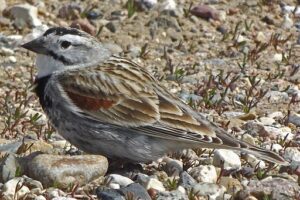
Andeansolitaire, CC BY-SA 4.0, via Wikimedia Commons
The naming convention for a few of the world’s many species of birds has sometimes been in reverence to the individuals who “discovered” them by research, other forms of supplied data, or simply by the assignation of honor. Many naturalists have acknowledged the existence of birds and have presented studied information on a bird.
In the U.S., several birds have appended names with a person of note own’s name. For example, there is the Anna’s Hummingbird, a common non-migrating Western Coast hummingbird that can be found from Canada down to Mexico. It acquired its common name from the French courtier, Anne DeBelle, who was gifted the name from the French naturalist, René Lesson. Lesson was responsible for the bird’s original description. Another is the McCown’s Longspur, recently changed to Thick-billed Longspur in 2020.
Motivated by Inclusivity
The American Ornithological Society (AOS) has recently come to a momentous decision to change the names of all birds that have an honored name attached (like those above) to simpler descriptive names. The changes come about because of concern over the history of some of the honored names. James P. McCown, for example, was a Confederate general who was honored by the naming of the longspur mentioned above. However, General McCown was also a slave owner, and the name of the bird is a consistent reminder that history was not always at its best.
The decision to rename birds that have been named after controversial historical figures has been reached to help alleviate reminders of racism and misogyny. Early in November of 2023, the AOS group released a bulletin to the media that all birds inside the U.S. and Canada with an assigned honorific name will have a replacement name beginning in 2024. This will initially impact around 70-80 birds in the first year. In addition to the newly assigned names, a new convention in naming will be instituted by AOS going forward. This new convention will eliminate the ability to assign honorary names to birds to avoid history-related complications in the future.
I provide an extract from the communique here from AOS President, Colleen Handel, PhD., a research wildlife biologist employed by the U.S. Geological Survey in the state of Alaska. Handel states: “There is power in a name, and some English bird names have associations with the past that continue to be exclusionary and harmful today. We need a much more inclusive and engaging scientific process that focuses attention on the unique features and beauty of the birds themselves. Everyone who loves and cares about birds should be able to enjoy and study them freely—and birds need our help now more than ever.” (You can read that AOS-issued release here.)
The simple purpose of the expected name changes is to remove old, implied biases that have a harmful impact on everyone. The naming convention being impacted began in the 1800s to give prominence to individuals regardless of their standing or commercial involvements. Whatever the prominence was back in those days, they no longer exist today. The world redefines itself as a grouping of diverse peoples and is steadily moving in that direction. These name changes help to reach that goal in a vital area.
Birds also have scientific names attached to them in addition to the common names applied. These scientific names will remain in place as they do not reference anything outside of genus affiliations.
